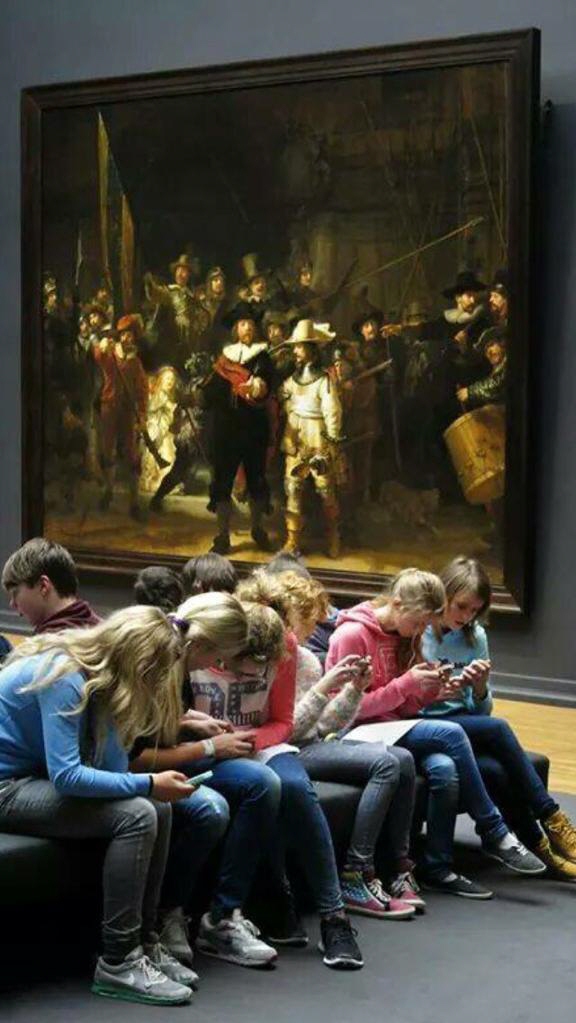
Illustrators, Animators and Louis C.K.: Art Commenting on Smartphone Life
The drawbacks of the little glass rectangle in our pockets
When it comes to the unintended consequences of technology, no one could have foreseen the social side effects of smartphone usage. Marrying a small screen with mobile connectivity was meant to add convenience to our lives, and it predictably has; but it has also fundamentally changed how smartphone users communicate with people—to our detriment, I believe—and examples of this can be seen indoors and out, all around the world.
Part of me is relieved it isn't just Americans. By now you've surely seen this photo, which began circulating earlier this year:
 Enter a caption (optional)
Enter a caption (optional)That's Rembrandt's The Shooting Company of Frans Banning Cocq and Willem van Ruytenburch, a/k/a The Night Watch, being ignored by schoolchildren in Amsterdam's Rijksmuseum. (One blogger insists they are merely consulting the Rijksmuseum's app, but does not back this up with any evidence.) The internet being an unkind place, parodies of the scene began popping up:
 Enter a caption (optional)
Enter a caption (optional) Enter a caption (optional)
Enter a caption (optional) Enter a caption (optional)
Enter a caption (optional) Enter a caption (optional)
Enter a caption (optional) Enter a caption (optional)
Enter a caption (optional)Perhaps the funniest was this one, which arms the Night Watch characters with modern kit, transforming a pole-arm into a selfie stick and adding iPads and Beats headphones for good measure:
 Enter a caption (optional)
Enter a caption (optional)The American comedian Louis C.K. had this to say about the drawbacks to allowing children to learn early communication skills via a smartphone:
Of course, we all know it's not only kids that are being held in the thrall of smartphones. The New Yorker periodically skewers a wider age range of society with its trenchant cover art and cartoons:
 Enter a caption (optional)
Enter a caption (optional) Enter a caption (optional)
Enter a caption (optional) Enter a caption (optional)
Enter a caption (optional) Enter a caption (optional)
Enter a caption (optional) Enter a caption (optional)
Enter a caption (optional)So that's Western society for you. Meanwhile, how are things over in China, the world's largest smartphone market? According to award-winning animator Xie Chenglin, not much better. This piece by Xie, which won Beijing's Central Academy of Fine Arts Annual Award, is dialogue-free so anyone can understand it. It's also marginally NSFW:
The term "phubbing" was first coined a few years ago and referred specifically to the act of snubbing someone in person by burying your phone in your nose instead. It's since expanded to signify a person's total absorption into their phone, allegedly "connecting" to people and places remote to their location, while completely oblivious to the actual world around them.
In broad strokes this isn't a new phenomenon; when I was growing up we had a similar (but bulkier) device with black-hole-like properties, it was called a television. The people in the trance of one were known as "shut-ins" or "couch potatoes." The key difference is that "phubbers" can practice their vice whilst remaining mobile. So I guess we have made some progress.
 Enter a caption (optional)
Enter a caption (optional)-
oFavorite This
-
Q4Comment
K
{Welcome
Create a Core77 Account
Already have an account? Sign In
By creating a Core77 account you confirm that you accept the Terms of Use
K
Reset Password
Please enter your email and we will send an email to reset your password.


Comments
What the first illustration don't say is that they probably all searching informations about the painting direcly in the museum to complet a test there teacher give them to help kid's to get the contexte of the painting, thing that museum fall to do most of the time.
I just feel bad for that poor girl's back in the skyscraper photo. Whoever photoshopped that never took a class on anatomy or life drawing.
Before the internet museums preserved the past, but they also chose what pieces of the past (whose perspective) was valuable to preserve. They are powerful because of the moments of history that they preserve, but they are biased and skewed by the fact that it took wealthy and powerful people to carry them through time as an institution.
That painting took skill to create and much can be derived from it's content, but I do not think it is a bad thing that those youth are ignoring it. As we move into the future and continue to explore the new possibilities of who gets to define what is important to take note of, paintings like the night watch will be understood as political objects as much as they are pieces of history. These youth are choosing where to put their attention, and smartphones give them agency to take back a small measure of their time and attention from the demands of an unjust education system which prioritizes eurocentric, power-centric narratives.
Do you mean to imply that you think these children are ignoring everything but their phones as a political protest? Coming to a conclusion like that is just as bad as the revisionist history that you've implied they're purposefully avoiding. I'll admit that it's possible, but I think it's highly improbable that there was any thought or foresight involved with the scene depicted.